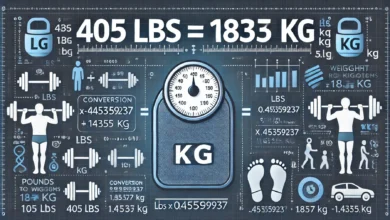69 kg to lbs Accurate Conversion with Examples & Quick Reference

When you’re dealing with different measurement systems, conversions can get tricky. Whether you’re traveling, cooking, or tracking your fitness progress, knowing how to convert kilograms to pounds is essential. If you’re specifically looking for how to convert 69 kg to lbs, you’re in the right place. This article will walk you through the conversion process, provide examples, and help you understand why these conversions matter.
What Does 69 Kilograms Mean in Pounds?
To convert 69 kg to lbs, we use the standard formula:
1 kilogram = 2.20462 pounds
Now, multiply:
69 kg × 2.20462 = 152.119 pounds
So, 69 kilograms equals 152.12 pounds (rounded to two decimal places).
Why Do We Convert Kilograms to Pounds?
In many parts of the world, kilograms are used as the primary unit for measuring weight. However, countries like the United States and a few others still use pounds. Therefore, conversions like 69 kg to lbs become crucial in various situations, such as:
- Traveling abroad
- Buying gym equipment
- Following fitness plans
- Understanding food labels
- Shipping or mailing packages
Formula for Converting Kilograms to Pounds
Here’s a simple step-by-step breakdown:
- Take the weight in kilograms (in this case, 69 kg).
- Multiply by the conversion factor (2.20462).
- The result is the weight in pounds.
Formula: Weight in lbs = Weight in kg × 2.20462
This standard formula can be used for converting any weight from kg to lbs.
Quick Reference Conversion Table
| Kilograms (kg) | Pounds (lbs) |
|---|---|
| 67 kg | 147.71 lbs |
| 68 kg | 149.91 lbs |
| 69 kg | 152.12 lbs |
| 70 kg | 154.32 lbs |
| 71 kg | 156.53 lbs |
This quick reference makes it easier to visualize the weights without doing the math each time.
Real-Life Applications of 69 kg in Pounds
Knowing how much 69 kg in pounds is can be beneficial in several practical areas:
1. Fitness Tracking
If you’re following a workout plan that mentions pounds, understanding your weight in lbs helps align your progress. For example, if your trainer in the U.S. sets targets in pounds, converting from kg is essential.
2. Online Shopping
Some products list weights in pounds. When you see a label or shipping cost based on weight, knowing your item weighs 152.12 lbs instead of 69 kg can be quite handy.
3. Cooking and Nutrition
Certain international recipes use pounds instead of kilograms. Converting accurately ensures your dish turns out just right.
Common Mistakes to Avoid While Converting
- Using the wrong formula: Always multiply by 2.20462, not any rounded number like 2.2.
- Rounding too early: Only round the final result for accuracy.
- Ignoring context: Understand why the weight is being converted. For health or legal purposes, precise numbers matter.
Frequently Asked Questions (FAQs)
1. How many pounds is 69 kg exactly?
69 kilograms is exactly 152.119 pounds.
2. Is 69 kg a healthy weight?
It depends on your height and body type. Use BMI calculators to determine a healthy weight range.
3. Can I use a calculator to convert kg to lbs?
Yes! You can use online converters or a standard calculator using the formula kg × 2.20462.
4. Why is the conversion factor not a whole number?
The metric and imperial systems are based on different standards, so the factor is a precise decimal to maintain accuracy.
5. How do I convert lbs back to kg?
To convert pounds back to kilograms, divide by 2.20462.
Formula: Weight in kg = Weight in lbs ÷ 2.20462
6. Is 152 lbs considered overweight?
It varies by individual. Check with a doctor or use a BMI chart to see if 152 lbs is a healthy weight for your height.
Conclusion
Understanding how to convert 69 kg to lbs is a practical skill that applies to everyday life. Whether you’re tracking your health goals, making a purchase, or simply trying to understand a number on a label, knowing this conversion helps you make informed decisions. Remember, 69 kilograms equals approximately 152.12 pounds, and you can easily use the formula or a conversion chart anytime you need.




